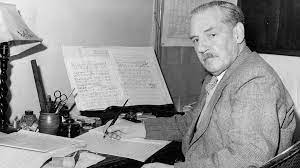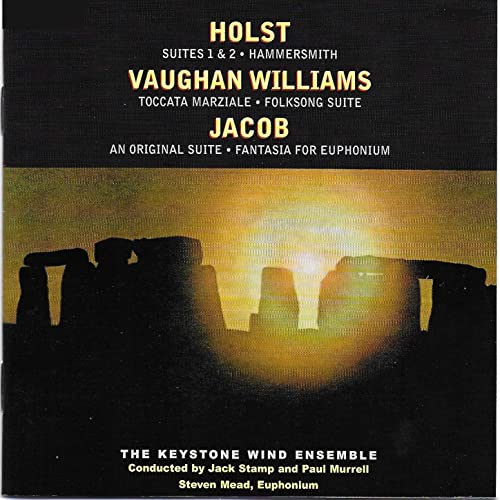
Jacob, Gordon
Gordon Jacob was born in Upper Norwood, London, the seventh son and youngest of ten children of Stephen Jacob, and his wife, Clara Laura, née Forlong. Stephen Jacob, an official of the Indian Civil Service based in Calcutta, died when Gordon was three.[1] Jacob was educated at Dulwich College, and enlisted in the Queen’s Royal Regiment (West Surrey) at the outbreak of the First World War.[2][3] He was taken prisoner in 1917, and in the prison camp he studied a harmony textbook in the camp library and began composing. He wrote for an orchestra of his fellow prisoners, with assorted instruments. After the war he studied journalism before turning to music. He took a correspondence course, gained an ARCM diploma and was accepted as a full-time student at the Royal College of Music (RCM) in 1920. There, he was a pupil of Charles Villiers Stanford and Ralph Vaughan Williams (composition), Herbert Howells (music theory) and Adrian Boult (conducting), from whom he learned the “economy and decision” of his podium technique.[1][4]
At the end of his student course in 1924, Gordon became a teacher of music, briefly at Birkbeck and Morley Colleges, and then at the RCM, where he remained until his retirement in 1966.[5] He was professor of music theory, composition and orchestration.[2] Among his students at the RCM were Malcolm Arnold, Ruth Gipps, Imogen Holst, Cyril Smith, Philip Cannon, Pamela Harrison, Joseph Horovitz, Bernard Stevens and John Warrack.[3]
In addition to his teaching commitments he was a regular examiner for the Associated Board of the Royal Schools of Music, and from 1947 to 1957 he was editor of Penguin Musical Scores.[2] He contributed articles to musical journals and to Grove’s Dictionary of Music and Musicians and wrote four books: Orchestral Technique, a Manual for Students (1931); How to Read a Score (1944); The Composer and his Art (1955); and The Elements of Orchestration (1962).[2]
In 1959 a BBC television documentary about Jacob was directed by Ken Russell; in the following years, under its controller of music William Glock, the BBC was seen as increasingly hostile to living composers who wrote tonal music. It was always denied that Glock had a blacklist,[6] but music by non avant-garde composers, including Edmund Rubbra, Arnold Bax, John Ireland and even William Walton, was demonstrably out of favour with the BBC during the 1960s.[7] By this decade a large proportion of a composer’s income came from royalties for broadcasts, and like others of his generation, Jacob suffered from the BBC’s disinclination to play his music. He was fortunate in having a steady stream of commissions from the US, where his music was popular with university wind-bands.[1] He never retired from composing, and went on writing until shortly before his death.[8]
Jacob was twice married, first in 1924 to Sydney Gray, elder daughter of the Rev Arthur Gray of Ipswich. She died in 1958, and the following year he married Margaret Sidney Hannah Gray, the niece of his first wife. There were a son and daughter of the second marriage.[2]
Jacob died at his home in Saffron Walden, Essex, in 1984, aged 88.[1]
Awards and honours
While a student at the RCM Jacob won the Arthur Sullivan composition prize. He was awarded a doctorate (DMus) by the University of London in 1935, and the John Collard Fellowship by the Worshipful Company of Musicians in 1943. He was elected as a Fellow of the Royal College of Music in 1946, and was made an honorary Fellow of the Royal Academy of Music the following year. In 1968 he was appointed CBE.[2]
Compositions
Jacob was a prolific composer. Grove lists 16 concertos by him for a wide variety of solo instruments, including trombone and timpani. A website dedicated to Jacob lists more than 700 original compositions or arrangements of existing music.[9] His biographer (and former pupil) Eric Wetherell writes that as a composer, Jacob was influenced more by early 20th-century French and Russian examples rather than the German tradition. Wetherell writes of Jacob’s “clarity of structure and instrumental writing that shows a keen awareness of the capabilities and limitations of every instrument”.[3] Reviewing a concert of his music given in 1939, The Times said, “As a general description, ‘Good, but a little dry’ might be justly applied to Jacob’s work”.[10]
In the 1920s and 1930s Jacob composed music for choral societies and school choirs, which provided a steady income, in between more ambitious compositions. From his works of the 1920s, Wetherell singles out a viola concerto (1926), a piano concerto followed (1927) and the First Symphony (1929) dedicated to the memory of Jacob’s favourite brother who was killed in the First World War. Large-scale works from the 1930s include an oboe concerto for Léon Goossens (1935) and Variations on an Original Theme (1937)
In the 1930s Jacob, along with several other young composers, wrote for the Sadler’s Wells Ballet Company (now The Royal Ballet). His one original ballet (other than a student work, The Jew in the Bush (1928)),[11] was Uncle Remus (1934), written for them. During the Second World War, Jacob wrote music for several propaganda films, and after the war he provided the score for the feature film Esther Waters (1948).[12] A more personal take on the war is evident in the austere Symphony for Strings (1943), written for the Boyd Neel Orchestra.[13]
Jacob’s Second Symphony, premiered on 1 May 1946 at a BBC studio recoding,[14] was considered by one reviewer to be “perhaps the most stimulating work that has yet come from this composer”. The reviewer remarked on the work’s intensity of feeling, ranging from romantic excitement in the first movement, through poignancy and fury in the two middle movements to a mood of heroism in the final passacaglia.[15] Four new works appeared in 1951, the year of the Festival of Britain: Music for a Festival (for brass and military bands), concertos for flute and for horn, and the cantata A Goodly Heritage.[8]
Among the original compositions from Jacob’s later years was incidental music to a dramatised adaptation of the biblical Book of Job, first performed at the Festival of the Arts, Saffron Walden, and later broadcast by the BBC.[16]
